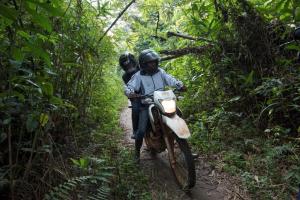On the hunt for Ebola in the Democratic Republic of Congo
Marie-Roseline Darnycka Bélizaire is on the front-lines of the battle against Ebola.
She’s leading the hunt for the virus in the Itipo area in the northwest of the Democratic Republic of the Congo. The communities at risk are spread out over a wide area and the roads are bad. Her team of more than 20 field epidemiologists is using mostly motorcycles to get around.
Marie-Roseline Belizaire said “We have to go sometimes as far as 80 km from the coordination base, so in a day we can do 160 km.”
Today, in the company of one of her field supervisors, Marie-Roseline is looking for a person who is the contact of a confirmed case of Ebola. The person has left his home and has gone to visit relatives in a remote corner of the Itipo area.
The ride is dusty and hot.
“The roads are not good so we have to be very careful. We go so slowly so it is as if we are walking, but walking with a motorcycle,” said Marie-Roseline.
At some point the road is so bad, Marie-Roseline and the field supervisor have to get off the motorcycle and start hacking their way through thick brush.
Marie-Roseline said “This road is not very well defined. But this is what the supervisor, who knows very well the road, told me to take to reach the contact that we are looking for.”
In the end she learns the person she is trying to track down has returned home and she catches up with him in his village closer to central Itipo. She supervises a community agent as he takes the contact’s temperature and then double checks if he did it correctly. The contact is grateful for the surveillance team’s persistence.
Franck (pseudonym) Contact of Confirmed Ebola Case (Lingala) said “I went away for four days. They found me and took my temperature and it was normal.”
Marie-Roseline and her team also regularly visit health clinics to check and see if they are getting any suspicious cases of people who have symptoms resembling Ebola.
Tracing and then following all the contacts of confirmed and probable cases of Ebola is vital to controlling the outbreak.
“To end the Ebola outbreak you have to stop the chain of transmission and contact tracing is the only way to stop the chain of transmission,” said Pierre Rollin, Ebola Expert, U.S. Centers for Disease Control and Prevention.
WHO along with the Ministry of Health and other partners have managed to rapidly set up an effective surveillance system. When the team arrived on 30 May there were 153 contacts listed for following. Two weeks later there were 400 contacts listed with 94% being regularly monitored.
“I know at the end of the road, I will see somebody and I will keep him safe from Ebola,” said Marie-Roseline. “So I have to keep going, whatever the difficulty, I’m facing on the road.”



